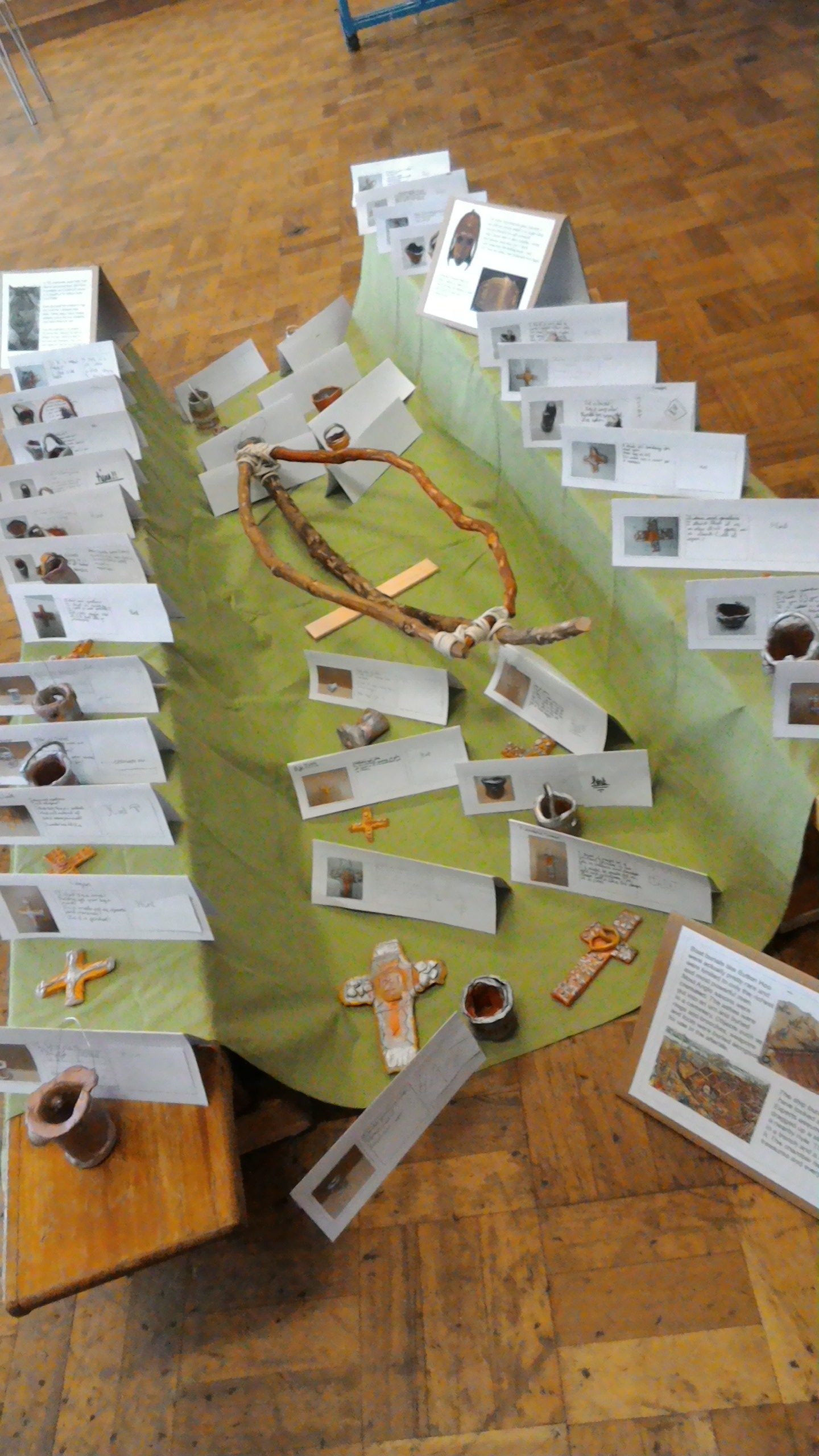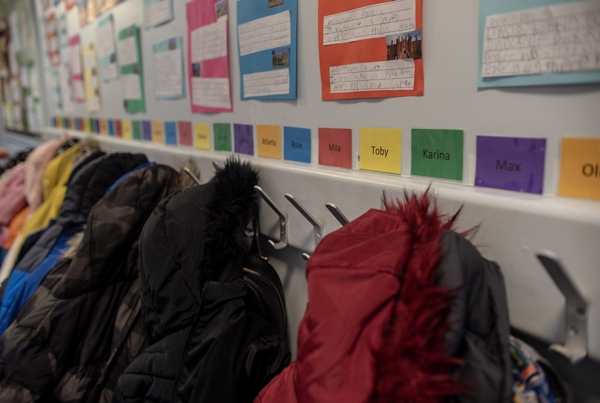Curriculum
Overview of our Curriculum
At Norris Bank Primary, we place a strong emphasis on developing the core key skills within English, Mathematics and Computing, while at the same time providing children with opportunities to be involved in their own learning with plenty of real experiences – promoting a sense of purpose, motivation, enjoyment, enthusiasm and confidence through learning.
The Foundation Stage Curriculum is for children aged from three years until the end of their Reception year in the primary school. This national early years curriculum consists of seven areas of learning which are all interconnected. Three areas are particularly crucial for igniting our children’s curiosity and love for learning, and for building their capacity to learn, form relationships and thrive. These three prime areas are:
- Communication and language
- Physical development
- Personal, social and emotional development
Within these three areas are four specific areas:
- Literacy
- Mathematics
- Understanding the world
- Expressive arts and design
The phonics scheme which we use throughout the school is ‘Little Wandle’.
Every child is seen as a unique individual and we aim to help each child to develop their skills and abilities from the stage they have reached on entry to our school. To help support this further we liaise closely with our feeder nurseries, pre-schools and parent prior to their September admission.
The National Curriculum from 2014 for children from Year 1 onwards, consists of nine subjects. The ‘core’ subjects are:
- English
- Mathematics
- Science
- Computing (formerly Information and Communication Technology (ICT))
- Religious Education
The other foundation subjects are: Art, Music, Geography, History, Design and Technology and Physical Education. Children also begin to learn Spanish from Year 3.
We teach through a topic-based approach whereby the skills the children learn can be applied to a range of contexts. The children are grouped across both key stages and these groupings are fluid depending on where children may need additional support or extension work with any given skill or unit of work.
Sports and Games are offered as part of our PE curriculum and as extra-curricular activities. Gymnastics, small apparatus skills and team games are also taught. Our school has a good-sized hall, hard play area and sports field. We participate fully in inter-school competitions and local events.
Music is enjoyed by everyone at our school. As well as the planned weekly lessons, there is a strong tradition of playing a wide range of instruments and singing. Private lessons during the school day are available through Stockport Music service.
We do not provide instruments, but they can be hired from Stockport Music Services:
- Tel: 0161 483 7636
- Email: music.service@stockport.gov.uk
- https://www.stockport.gov.uk/organisations/stockport-music-service
Religious Education follows the Stockport Agreed Syllabus and involves exploring spiritual concepts through a range of faith traditions rather than teaching children about religious doctrine. There is an assembly with an act of collective worship every day. We hope that all children will take part in all religious education activities and attend assemblies. We do, however, recognise that some parents might wish to withdraw their children. Any parent who wishes to take this action should make a relevant, written request to the headteacher.
Sex and Relationships Education will be presented in the context of caring relationships and of respect for others and self. The process of reproduction in animals and plants will feature in Science work undertaken at all stages of children’s schooling. A full version of the Governing Body’s Policy for Sex and Relationships Education is available from the school website
https://norrisbank.stockport.sch.uk/nbps-policies/
or on request.
Educational Visits
Educational visits are planned for all classes to enrich the curriculum and widen the children’s knowledge and understanding of the world around them. When arrangements are made for children to leave the school site, parents will be given details in advance and asked for their consent.
Children with Specific Needs
In line with the SEND code of practice all children, including those experiencing Special Educational Needs are welcomed into our school. We have clear policies detailing ways in which teachers will meet the needs of such groups of children and we draw on external support when required. We have a SENDCO and the teachers constantly monitor the educational, emotional and physical needs of each child. In this way any need experienced by a pupil can be identified and resolved quickly. Please go to each class page where a detailed overview of the half term topics being taught is available.
If you would like to find out more about the 2014 National Curriculum we follow, please select the following link:
National Curriculum in England: Primary Curriculum
Overview of our Creative Curriculum
At Norris Bank we aim to inspire our children to see learning as a journey. We want them to have a love of learning and feel passionate about discovering new things and have real ownership of their outcomes. Learning enables them to have aspirational aims by developing and using all of their skills and talents. Everyone is an individual with dreams and ambitions, and we want to give our children the best start in their educational journey so that they feel confident, independent, resilient and able to tackle whatever life throws at them.
To support and achieve this aim we have always tried to ensure that our curriculum model is not too narrowly focused on just the core subjects but allows children to undertake a broad breadth of quality education that provides opportunities beyond it. We want to ensure that the learning is relevant to the children and their future needs. To support this, we are going to further develop a more creative curriculum approach over the coming year.
Our aim is to ensure that wherever possible we make meaningful links between the individual subjects of the curriculum and generate carefully planned units of learning that engage children and provide a clear context for developing their knowledge and understanding. Ensuring that our children enjoy their learning and are inspired is of central importance and to do this we are designing, cohesive, dynamic and purposeful topics.
Every creative topic will contain a ‘hook’ to grab the attention and interest of the children and is driven by the outcome that will be undertaken at the culmination of the topic. This gives a clear pertinent reason for the learning that the children will undertake and provides valuable opportunities to apply their learning in a range of contexts.
The majority of our topics will contain 3 lead subjects and 2 supporting subjects. All of which are underpinned by our GROW values (Goals, Respect, Ownership and Working Together) which are designed to further develop the children as well rounded individuals who will have the necessary skills to support their future development and give them a wider range of abilities and skills than those outlines within the subject areas of the National Curriculum.
Careful planning enables teachers to identify learning opportunities and activities that will enable the children to meet the required objectives and develop their understanding at a greater depth rather than just focusing on merely activities to complete. This ensures that there are a range of foci for the children’s learning outcomes that are relevant and appropriate to children working at a range of levels and that there exists sufficient support and challenge for all.
Each topic will be carefully evaluated on completion in order to identify where it has been successful and where it could be developed further. Topics will not just be repeated year after year but will be altered and improved over time in order to keep the curriculum fresh and dynamic for the children.
Not all areas of the curriculum can always be integrated and as such there will be subjects e.g. phonics that are delivered discretely. A curriculum map is produced populated by each year group and scrutinised by subject coordinators to ensure that National Curriculum requirements in terms of coverage and progression are in place and fulfilled.
Early Years
You can find the age-related information for Early Years at the following link:
You can find the age-related expectations in mathematics, reading and writing together with a curriculum overview for each year group at the following links:
Year 1
- Being a mathematician in year 1
- Being a reader in year 1
- Being a writer in year 1
- Year 1 Creative Curriculum Overview 2023-24
Year 2
- Being a mathematician in year 2
- Being a reader in year 2
- Being a writer in year 2
- Year 2 Creative Curriculum Overview 2023-24
For more information on year 2 SATS, select the following link:
Year 3
- Being a mathematician in year 3
- Being a reader in year 3
- Being a writer in year 3
- Year 3 Creative Curriculum Overview 2023-24
Year 4
- Being a mathematician in year 4
- Being a reader in year 4
- Being a writer in year 4
- Year 4 Creative Curriculum Overview 2023-24
Year 5
- Being a mathematician in year 5
- Being a reader in year 5
- Being a writer in year 5
- Year 5 Creative Curriculum Overview 2023-24
Year 6
- Being a mathematician in year 6
- Being a reader in year 6
- Being a writer in year 6
- Year 6 Creative Curriculum Overview 2023-24
For more information on year 6 SATS, select the following link:


